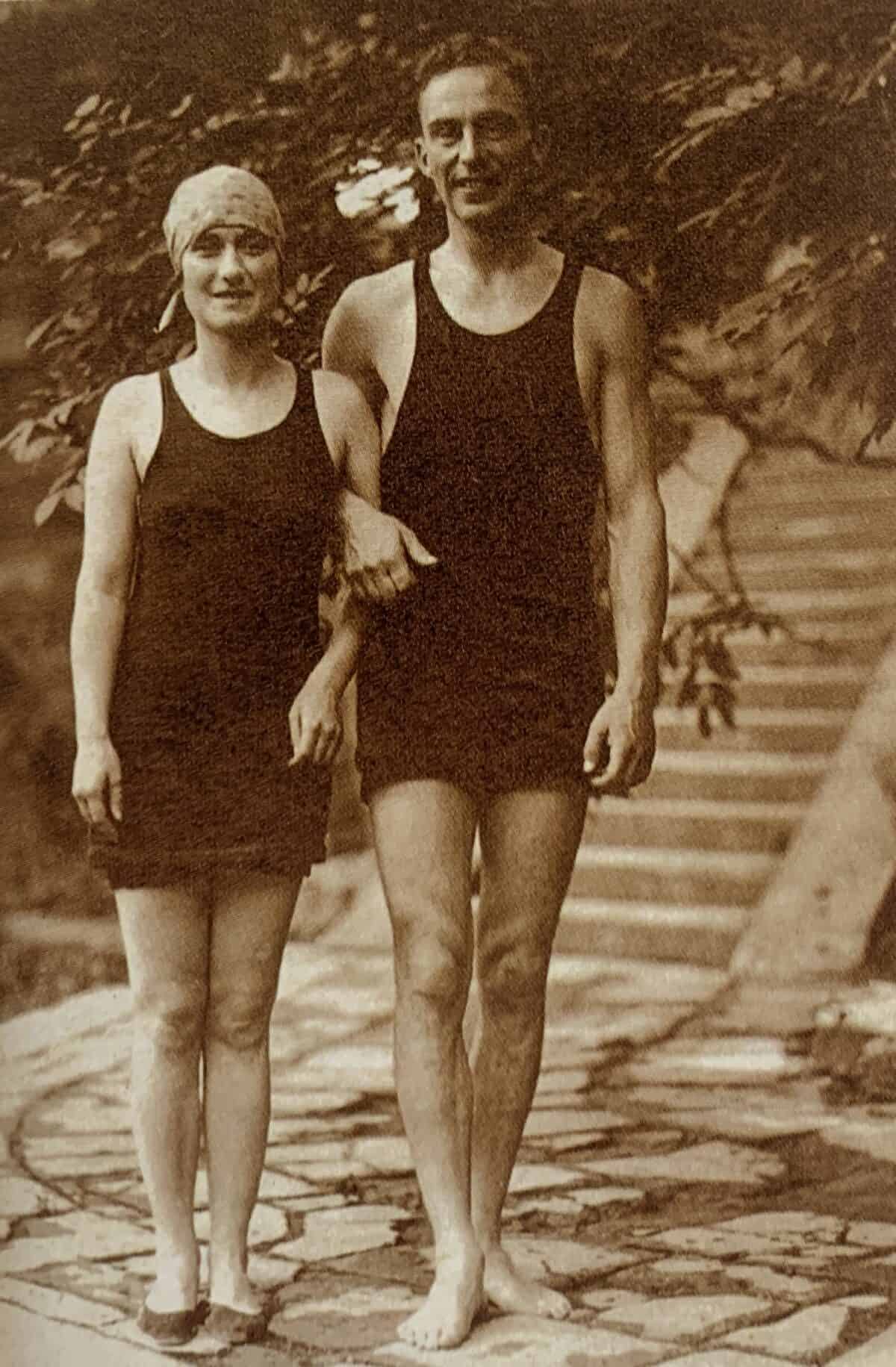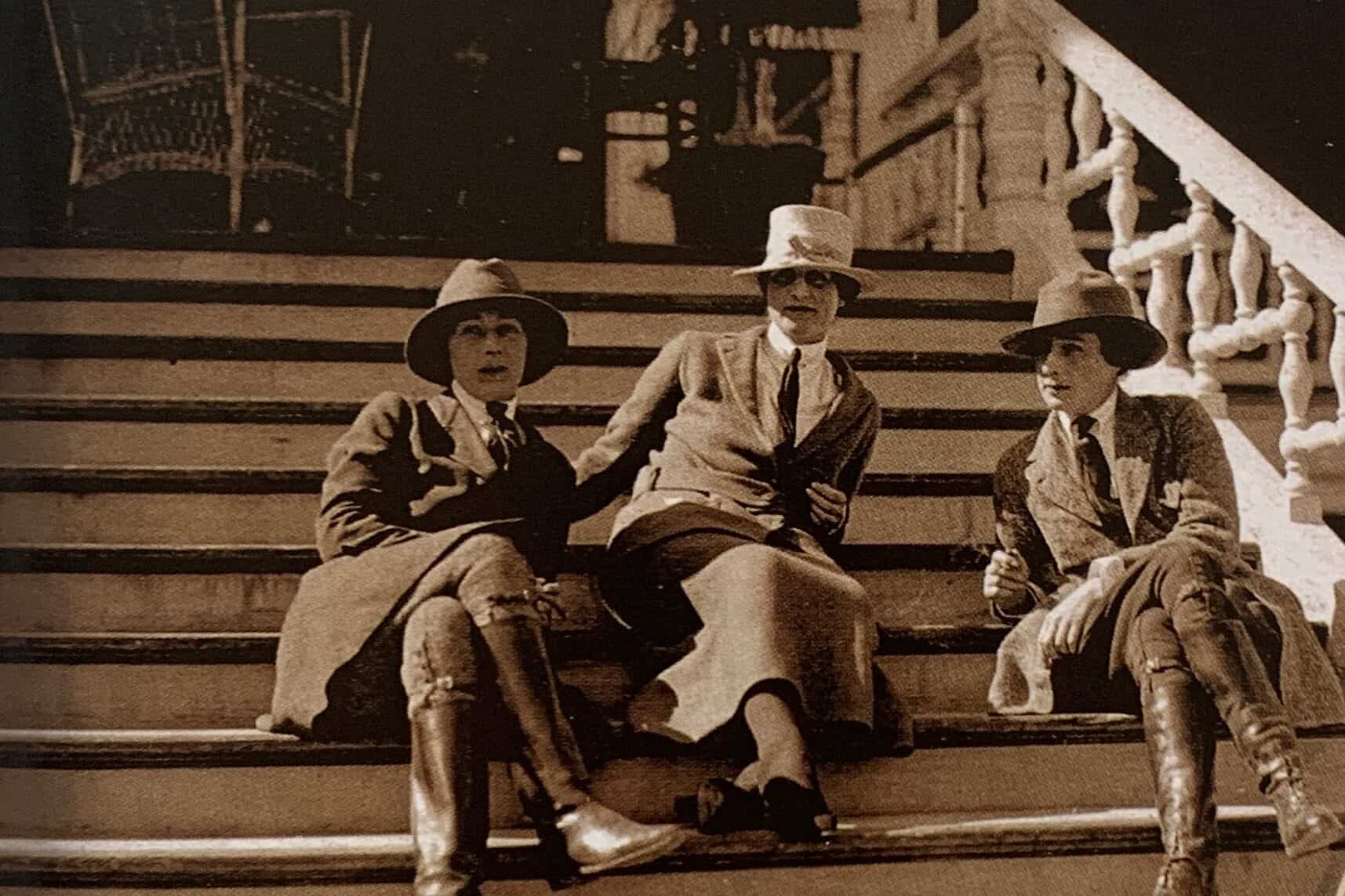Paul French is a British author and sinologist. He has published numerous nonfiction titles set in early 20th-century China, including City of Devils: The Two Men Who Ruled the Underworld of Old Shanghai and Midnight in Peking: How the Murder of a Young Englishwoman Haunted the Last Days of Old China. He is also the author of a work of North Korean history called North Korea: State of Paranoia. In the late nineties, he moved to Shanghai where he ran a market research firm called Access Asia. In 2011, he sold it, returned to London and became a full-time writer with a focus on Chinese history. His newest book, Her Lotus Year: China, the Roaring Twenties, and the Making of Wallis Simpson, examines the year that Wallis Simpson — who later became the Duchess of Windsor after marrying the former King Edward VIII— spent in interwar China, from 1924-25.

Illustration by Lauren Crow
Q: How did Wallis Simpson’s time in China catch your attention?
A: I’m always looking for ways to tell Chinese history through the lens of other people, whether it’s murder victims or policemen or gangsters or Wallis Simpson. The year that she was there, autumn 1924 to autumn 1925, was a pivotal moment in China’s history. But I think if I just wrote a book called 1925 China, it maybe wouldn’t attract a wide audience, only the usual China sorts would read it. Bringing Wallis in makes it interesting.
When I lived in Shanghai, one thing that people always used to ask me about were the rumors regarding Wallis Simpson’s time in Shanghai — which are not true, but are legendary and very salacious. The rumors have become part of that wider swirl of sensationalism that makes old Shanghai seem really quite sexy. People still get that vibe when they go there, or used to. It’s a big, chaotic city and, until recently, pretty wide-open by Chinese standards. In the 90s/early 2000s you could drink till dawn, the ladies of the night would approach you on the street. And it’s a good way for readers to get into modern Chinese history, because it’s this hai-pai, “East meets West”, kind of city. You feel you can navigate your way around, it’s semi-familiar to Europeans and Americans.
| BIO AT A GLANCE | |
|---|---|
| AGE | 58 |
| BIRTHPLACE | London, UK |
Wallis’ brief sojourn in China ends up being a really important moment in her life. She grows enormously as a person. She becomes a major collector of Chinese curios. But she never really intended to go to China. What brought her there?
She doesn’t set off with the dream of going to China, with a Lonely Planet in one hand and chopsticks in the other. She goes because her marriage is a mess. She wanted to divorce her abusive first husband. Her family in Baltimore was impoverished southern gentility. She’d been a debutante. She went to a private school. But they hadn’t got any money. She’s got manners, a bit of French, and can ride a horse — that’s pretty much it.
| MISCELLANEA | |
|---|---|
| FAVORITE FILM | The Third Man |
| MOST ADMIRED | George Smiley (and don’t try and tell me he’s fictional… I believe…) |
Her husband, Commander Win Spencer, gets posted to the rather obscure U.S. Navy Southern Patrol, which just went from Hong Kong up to Guangzhou and the Pearl River and back, had just two boats, both of which were old Spanish ships that had been seized in the 1898 Spanish-American War.
Win got stuck on one of these boats, going up and down in sweltering heat to places he’s not very interested in, rescuing people that aren’t very interesting (mostly missionaries). When Wallis decides to join him and try to restart their failing marriage, she has to do a grueling six week trip on a U.S. Navy transport, which is not very comfortable. She’d never given Hong Kong or China one second of thought in her life before she sailed.
Nobody, least of all a single foreign woman, went from the safety of the International Settlement of Shanghai to northern China on a shopping trip in the winter of 1924! Something else was motivating her travels.
Ultimately, she didn’t like Hong Kong much. They get pretty bad digs that she had to live in alone when Win was at sea. There wasn’t much of a social life there in 1924 for an American. Though an officer’s wife, she was bemused and ostracized by the class hierarchies and snobberies of the British colonials. When they went to western restaurants, the food was all British and boiled to within an inch of its life! Eventually the abuse got too much and she decided to leave Win and fled to Shanghai.

When she got to Shanghai and away from Win and his violent temper, she met a couple of people who showed her around the town, such as Robbie Robinson, a rather suave British architect. He takes her to the Shanghai Race Club, ballroom dancing, shopping — all the fun of Shanghai in 1924. Then she decided to head further into China. By the time she gets to Peking, just before Christmas, she’s really starting to like it. She quickly adopts the hutong life. She starts scouring the markets and curio stores for bargains. She starts to deal in jade to visiting tourists without time to shop for themselves, and to develop her lifelong fashion sense — qipao inspired dresses, her chignon hairstyle, love of jade jewelry. She spends weekends in the Western Hills staying in the old temples, which were very popular with Peking’s “Foreign Colony” at the time.
She also had a love affair with a bachelor Italian naval commander. She found a way to be independent and casually cosmopolitan. She dined regularly at the American legation, the British legation, the Italian legation, the home of the Chinese Foreign Minister (Wellington Koo at the time). She was mixing nightly with sophisticated, educated, wealthy people — a far cry from petit bourgeois Baltimore or boring Navy towns. It prepared her for the sort of rarefied worlds that she entered later in London, Windsor, Lisbon and Paris.


Left: Wallis Simpson and Herman Rogers in the Western Hills, 1925. Wallis met Rogers (an American man) during her travels in China. Right: Wallis Simpson and Italian naval officer and bachelor Alberto da Zara at the Peking Races, Paomachang, 1925. Courtesy of Paul French.
So much of Wallis’ expat life would be familiar to contemporary expats. The cheap living, the heavy partying, the weekend escapes, the petty gossipping.
A lot of people that go to China experience a sense of being far away from home, but feeling very happy. It can be almost soporific, with the days sort of drifting by. You don’t seem to have too many cares. All sorts of stuff can be going on around you, whether it’s warlords fighting or, later, the general awfulness of communism that surrounds you. But you’re having the time of your life. You’re young and free.

That’s why Wallis called her sojourn in China her “Lotus Year”, referring to Homer’s Lotus Eaters, who lived in a state of dreamy forgetfulness, never to return home. I think that was and is a very common sense among expats in China — the years pass seemingly effortlessly and you feel slightly cut off from the concerns (mortgages, careers, marriage, babies, credit card payments, whatever) of your peers at home.
For non-Brits, can you explain the Duchess of Windsor’s stature in British politics and culture?
If you’re reasonably well-educated you know the 1936 abdication crisis story: Edward VIII is told he cannot marry Wallis [because she was a divorcee] so he abdicates his throne and empire for her. The greatest love story ever told, or was he the most manipulated man in history?

The way Wallis is seen in America is slightly different to the way she’s seen in Britain. That’s a function of the different sorts of media that we have. In Britain, Wallis is usually portrayed as the woman that almost brought down the monarchy, with the abdication of Edward VIII, which led to the crowning of George VI — the stutterer who never expected to be king. Arguably, the strain of being king, particularly during the war, caused his premature death (although one could argue, the 80 cigarettes a day and the unlimited liquor might have had something to do with it). But King George VI, of course, is the late Queen Elizabeth II’s father, and she remains a towering figure in British life.
So Wallis has invariably been seen as the twice-divorced American who got up to God-knows-what in China and who almost brought down the crown. Of course, there was (and often still is) a bit of good old fashioned British anti-Americanism at play here too — which we see now again perhaps with another divorced American woman who married into the royal family more recently!
And central to a lot of her bad public image was what is known as the “China Dossier.” What was that?
| BOOK CORNER |
|---|
| Ellroy’s LA Confidential remains a favorite but everyone knows it so I’d recommend Alexander Doblin’s Berlin Alexanderplatz, Jacques Yonnet’s massively underappreciated Rue des Maléfices, Jean Rhys’s Good Morning Midnight or Patrick Hamilton’s 20,000 Streets Under the Sky — I guess hidden urban underworlds are my thing! |
In 1936 the British Intelligence service concocted the so-called “China Dossier”, which never really existed — no copy has ever surfaced. Rather it was a sort of fake news confection of rumor and gossip that was spun and whispered among the Establishment, at Mayfair lunches and country house weekends. And it all centered around Wallis’s time in China. It’s never mentioned now that Wallis went to Hong Kong following her first husband, and then ran away into the China hinterlands to escape his fists.
The 1930s was the time of Sax Rohmer’s Fu Manchu novels becoming Hollywood B-movies, it was a time of the “yellow peril” in popular culture. This racism, combined with a healthy dose of 1930s misogyny, meant people hearing the whispers about the “China Dossier” asked themselves, “What the hell is a single white woman doing roaming around the Orient? Something must be wrong with her. Her moral compass must be off. Of course she’s a prostitute. Of course she’s going to pose naked for photographs. Of course she’s going to learn sexual tricks that will lure our king away from marrying a nice English rose.”
…in 1924, in Wallis’s world, it really wasn’t clear that any of this was going to happen. It felt a lot more likely that it would all blow up. This is the China that Wallis found herself in.
Even now Britain’s tabloid newspapers, particularly the Daily Mail, still love to retell those stories and the image of Shanghai and other Sinophobic tropes from the time are still dragged out and find an audience. To many they’re fun reading. But they’re not true. And they tell us a lot about how Europe saw China in the 1930s.
Her actual experience in China was quite admirable and courageous.

Her real journey across the country tells us quite a lot about her and also what a mad and dangerous time it was to travel in China.
She’s in Hong Kong during the worst ever labor strikes to have happened there. She’s in Guangzhou when there’s political factional fighting and more labor strikes — people are shooting each other in the street. And she’s probably the only woman on Shamian, an island enclave (sandbagged and barbed wire protected with British and French machine guns ready to repel any attack) controlled by the foreign powers at that time, which I think tells a story in itself.
She’s also in Shanghai, which is surrounded by fighting warlords. We mostly think of the warlords as being in the north of China and not around eastern China. But Wallis is watching trains of wounded and dead soldiers arrive from the First Jiangsu-Zhejiang War. She’s also watching trains leaving Shanghai North Station with crates of weapons that say, “Made in Germany,” “Made in England.” She sees what’s going on. She goes to Tianjin when there’s a typhoid epidemic. She gets across to Beijing, known then as Peking — a journey of just 70 miles, which takes two whole days because of bandit attacks on the train line. Beijing has several different warlord leaders take over that city while she’s there. Just before she arrives, Puyi [the last emperor of China] is kicked out of the Forbidden City. Then she leaves just after Dr Sun Yat-Sen [China’s first president] dies and there’s a major political vacuum. The May 30 Incident happens in Shanghai, where foreign police shoot Chinese protesters, and she’s caught up in the wave of anti-foreign protests in Peking.

In her memoirs, she makes very anodyne comments about her time, such as, “I decided to go from Shanghai to Beijing on a shopping trip” which means getting on a rusty, old steamer going up to Tianjin, where the port is literally icing in, warlords are fighting just outside the city, bandits are roaming the suburbs, there’s a typhoid epidemic and people are dropping dead around her. Nobody, least of all a single foreign woman, went from the safety of the International Settlement of Shanghai to northern China on a shopping trip in the winter of 1924! Something else was motivating her travels.
It was a highly complex geopolitical environment too.
Well, the Americans were trying to broker a peace deal between Sun Yat-Sen and the Northern Warlords, but the warlords didn’t want to talk to anyone. Sun Yat-Sen was dying of liver cancer. The Americans are having a hard time holding it all together. This notion of America as a peace broker in China, I don’t think that’s talked about enough — they really tried in 1924.

When Wallis gets to Peking, the city is rammed full of people because all the outstation missionaries and surrounding villagers have come to the city — Chinese and foreign. You can’t get a hotel room anywhere, but Wallis walks into a suite at the Grand Hôtel de Pékin on Chang’an Avenue, Peking’s number one hotel, and gets one. So something’s going on and I wanted to get to the bottom of that.
You’re referring to the theory that she was couriering messages for the U.S. Naval Intelligence services.
Yes, though I’m not the first person to suggest that. I tried all the usual things to confirm it, Freedom of Information acts, etc. but there’s no paper trail. The problem is that the Americans didn’t really have a formal intelligence service in the 1920s. Everything was done ad hoc. My evidence is her itinerary. We know why she goes to Shanghai: because she thinks she can get a divorce from Win. But getting a divorce there wasn’t possible. So then why not just get on a boat home, where she knows she can get the divorce? There’s a boat every week from Shanghai. But she doesn’t. She goes up to Tianjin — another port with liner services to the States. But then decides to head inland to Peking, further away from getting back to America.

You also have to look at who she meets on the way and where she stays. We do know that U.S. officials did use the navy (officers) wives like Wallis to exchange messages sometimes. At a time when communications had broken down, the train system was largely stalled, the mail disrupted and unsecure, the telegraph system broke, the only way to move things was by coastal steamer or physically across the country in some way.
She is often met by people pretty high up. In Tianjin it was a very important consul. Why would he meet her otherwise? When she gets to Peking, it’s Colonel Louis Little, head of the U.S. Marine guard at the embassy. Why, unless she had something for him, would he come and meet her, an estranged U.S. Navy wife? It doesn’t mean she was a spy as such, just that carrying some papers she was getting her ticket paid and a room at a hotel.

Clarence Gauss, the great American China Hand, who doesn’t feature enough in history books, came and met her in Tianjin. He got her a room at the Astor House Hotel (the best in town and also supposedly all booked out) and gets her on a train to Peking (almost impossible to get seats as everyone was fleeing typhoid-town) and has a U.S. Marine stationed in Tianjin hold a seat for her and other Marines carry her luggage. Why would Gauss do all this? Obviously she dropped off what she had to drop off and then Gauss asked her to go to Peking. Otherwise how do you explain her itinerary across China? She doesn’t think she knows anyone in Peking.
But why not not just reveal this in her memoir decades later?
By the time she wrote that memoir, it was 1956. For whatever reason she chose not to reveal what she was doing. Perhaps China had changed so much that she wanted to avoid anything to do with the ongoing rows in America at the time, led by McCarthy and Hoover, about “Who Lost China?” — those were vicious, nasty and ruined careers. Maybe she was asked not to do so, or she just didn’t feel it was something she wanted to get into.
Can you talk a bit about the tumultuous political moment this was all taking place in?
This is the theme that runs through this entire period. It was not a given that China was going to remain a unitary country. It was quite possible that China would burst apart or at best, become a federal country with independent provinces, a split between north and south, with myriad warlord fiefdoms. The notion of this thing that we call China was very much in question at the time. Remember until 1923, Mao Zedong was an advocate for Hunanese independence (they don’t talk about that much anymore!).
You’ve got a warlord-influenced government in Peking, you’ve got a nationalist government down in Guangzhou. You’ve got people who are still loyal to the Qing Dynasty and the last emperor. You’ve got people who feel very loyal to a republic, indeed to a very left wing version of a republic. You’ve got other people who are now organized communists. You’ve got the Muslim warlords out in Xinjiang. You’ve got this all going on and the Japanese are stoking it up and eventually looking to expand into Manchuria.
It is amazing to think of how divided China was, not just politically but culturally too.
When the Northern Warlords and Sun Yat-Sen spoke to each other, they mostly all spoke English, because they couldn’t always talk to each other, there was no common language. British diplomats would often have to speak five or six dialects, which is impressive (alongside French for diplomacy and probably Greek and Latin at school). You get people today who think they’re really fancy because they’ve got pretty good simplified Chinese. Wouldn’t get you a job in the mailroom at the embassy then!
There are journalists with newspapers in the UK who’ve been waiting a year, 18 months, more for a visa now. And even if the journalists can get [to China], they can’t move around in the way that they used to and people won’t talk to them in the way that they used to.
But I don’t think anyone thought it was in anyone’s interest for China to blow apart. It would have been a very messy collapse into warlord fiefdoms akin to medieval Central Europe. And America, as well as Britain and France, were worried about the Japanese position in northern China and especially the influence of the new Bolshevik Russia whispering in Sun’s ear. What happens to our spheres of influence, asked London and Paris? What about our trade through Shanghai? What about our colonies in Hong Kong, Indochina, and so on? So I think everyone was happy for the Americans to take the lead and have Clarence Gauss try to pull it all together. And he very nearly did, except that he couldn’t factor in the very aggressive cancer in Sun Yat-Sen’s liver.

In the end, there never was a peace settlement. It was left to Chiang Kai-Shek to drive the northern expedition and co-opt or wipe out the wearlords. But in 1924, in Wallis’s world, it really wasn’t clear that any of this was going to happen. It felt a lot more likely that it would all blow up. This is the China that Wallis found herself in.
Behaving as if she were “invulnerable”, as you write in the book.
That’s another expat trait that seems eternal. Everybody feels invulnerable… until they’re not.
Until you’re thrown in jail for “spying.”
The sudden and often jarring end to the China experience is something that comes up in everything I’ve ever written. I wrote a biography of Carl Crow, a great advertising guy from Missouri who was also a hostage negotiator and was in China for 25 years. In 1937 he becomes number three on the Japanese shit list. Bang. He’s got to go…one suitcase, a limited cash withdrawal and the next boat out.
I just read Hanchao Lu’s book, which is one of the best books on China written in a long time, called Shanghai Tai Chi. It’s all about the fifties and early sixties until the Cultural Revolution. It talks about old Shanghainese families who maintain their privileges, maintain their houses and money, still drank coffee in the morning and had baguettes and things like that. Some of that was allowed in order to get the economy back on its feet. Of course, in the Cultural Revolution that all goes away. All of a sudden, life’s over. This is a constant in China.

I wrote in City of Devils about the period in Shanghai when the Japanese are all around but the foreign concessions remain — Gudao — the Solitary Island. Then, ten minutes after Pearl Harbor, the Japanese roll into the international settlements and that’s it. Your life is over. You’re in a camp. It’s J.G. Ballard and Empire of the Sun.
This traces right the way through to Michael Spavor and Michael Kovrig [two Canadians who were imprisoned in China from 2018 to 2021], others who’ve been held for various commercial reasons such as the Irish businessman Richard O’Halloran, not to mention the murder of Neil Heywood [in connection with the case of Bo Xilai]. I think many people got a taste of it too, particularly in Shanghai, in Zero-Covid time.
You write books about a bygone China and they sell well. But what is your sense of the market for contemporary China books?
Well, it’s never been as good as we might think it is. But it’s really, really bad at the moment. In America that’s largely to do with the fact that it’s a very toxic atmosphere in Sino-U.S. relations. When I think of contemporary China books I hope Peter Hessler’s book, Other Rivers, is doing well because I thought it was really good. Of course, he writes well and he’s very balanced. But (wearing my publisher rather than writer hat) I don’t sense much appetite for books on contemporary China at the moment unless they hit a specific niche. I should declare that through my imprint with Bloomsbury Books — Asian Arguments — I published both Leta Hong Fincher’s Leftover Women and Jonathan Chatwin’s book on Deng Xiaoping, The Southern Tour — and they’ve done well. But it’s hard work.

Like us here in Europe, I think North America also has a record low number of people learning Mandarin. Chinese departments are not full to bursting in the way they were. I go around Chinese departments in the UK occasionally and I used to do a regular talk about why you could learn Chinese and not have to put a suit on and go work 18 hours a day for HSBC or PwC. That pitch would be very different today. To be honest, I’m not sure what you can do if you learn Chinese now. All the examples I used to have were: start a market research company, write history, start a listings magazine, online games, start a food delivery business. All the things that we knew people had done. You could get a film and TV co-production off the ground. But that’s all gone I feel. None of that’s happening.
I don’t know about the State Department, but China is not the great career path in the Foreign Office that it used to be, I’m told. If you go into Whitehall there can be a slight cloud of suspicion that hangs over you after you’ve been in China. It can derail your career. Having court cases progressing now involving British nationals accused of spying for China doesn’t help!
And there are far fewer journalists on the ground in China.
Yes. There are journalists with newspapers in the UK who’ve been waiting a year, 18 months, more for a visa now. And even if the journalists can get there, they can’t move around in the way that they used to and people won’t talk to them in the way that they used to. So they’re either not writing books or those books are not going to be so great maybe. They’re having to find quite niche subjects to write about and we’re left (sorry — but particularly in the USA) with the shouty books by extremely partisan people whose China knowledge is rarely as comprehensive as their prejudices, I’m afraid.

Brent Crane is a journalist based in San Diego. His work has been featured in The New Yorker, The New York Times, The Economist and elsewhere. @bcamcrane




